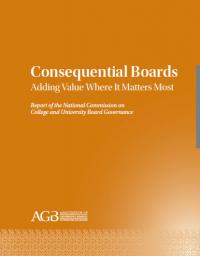
Dysfunctional governance of America’s higher education institutions has made the public skeptical that their leadership is contributing to the country’s well-being, according to a report commissioned by the Association of Governing Boards of Universities and Colleges.
Members of the association-established National Commission on College and University Board Governance gathered at the National Press Club Thursday to explain the report, citing high education costs and “lazy” and “self-serving” board governance.
University boards must lead the charge, the report says, to reconfigure higher education to recognize new student populations, altered educational delivery methods, basic changes in financing and rising expectations from the public.
“Higher education cannot expect to return to the traditions that worked happily 50 years ago, when mostly honorific boards concentrated on selecting prominent leaders and on fundraising, and in which state and federal governments did not ask many questions about performance,” says the report’s executive summary.
The report says that boards are best suited to lead these changes, as their fiduciary responsibility requires them to “focus on strategic long-term issues and the intersection of internal and public interests.”
 It recommends that boards improve collective governance with attention to board-president relationships, deliver higher-quality education at a lower cost, and increase attention to qualifications, recruitment and training of board members.
It recommends that boards improve collective governance with attention to board-president relationships, deliver higher-quality education at a lower cost, and increase attention to qualifications, recruitment and training of board members.
Commission members at Thursday’s press conference strongly affirmed the report’s findings and recommendations. Penn State University President Eric Barron described the report as “very thoughtful, very balanced and quite useful.”
“In particular, the notion of defining roles and understanding those roles is absolutely critical,” Barron said.
There are too many forms of “lazy governance” where boards are “imitating everyone else instead of being strategic,” said Gary Rhoades, a professor at the University of Arizona and the director of the school’s Center for the Study of Higher Education.
“It is relatively short-sighted, it is self-serving, and it is not sustainable,” Rhoades said. “But we keep doing it. We keep setting those practices in place as part of being strategic. But we are really imitating.”
University of Maryland System Chancellor William Kirwan said there is a “societal need” to expand the capacity of higher education by serving more students and restoring the American dream.
“If we have any hope of sustaining our preeminence as an economic superpower, we have got to have a competitive workforce, and ensuring the number and volume of college graduates able to sustain this powerful American economy,” Kirwan said.
Kirwan said boards must work with institutional leadership to collectively develop “more sustainable, long-term fiscal models” that address the issue of expanding capacity.
“Front and center of that has got to be the effort to find lower cost means of delivering high-quality education,” Kirwan said.
“If you are thinking strategically and thinking about how it is that you add value to an institution, I think that is a path to much more successful governance,” Barron said.
Association President Rick Legon said that while governance is not a “one-size-fits-all process” for all universities – since private, public and community schools all operate differently – the commission believes the basics of the report and the recommendations are broadly adaptable and appropriate across all of higher education.
Legon told The College Fix that boards need to shape the conversation by asking questions such as “What is our mission,” “What is working and what is not working academically” and “Are we investing in things that matter most to our mission?”
“Those are the hard questions we need to ask,” Legon said. “When a board has that level of conversation, they can then get to the list” of changes that need to happen in higher education.
College Fix reporter Michael Cipriano is a student at American University.
Like The College Fix on Facebook / Follow us on Twitter
IMAGE: trustypics/Flickr





Please join the conversation about our stories on Facebook, Twitter, Instagram, Reddit, MeWe, Rumble, Gab, Minds and Gettr.